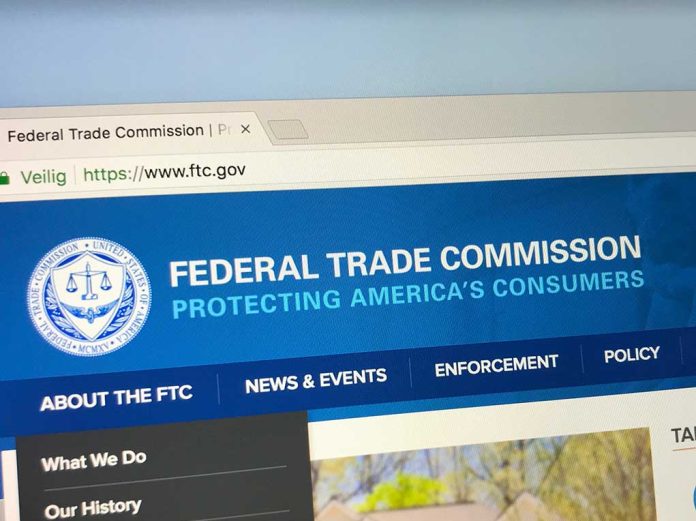
The Federal Trade Commission may force advertising giants Omnicom and Interpublic to end their coordinated boycotts of conservative media as a condition for their $13.25 billion merger approval.
Key Takeaways
- The FTC is investigating a proposed $13.25 billion merger between Omnicom and Interpublic that would create the world’s largest advertising agency with $25 billion in annual revenue.
- Chairman Andrew Ferguson’s FTC is considering a merger condition that would prevent the combined company from boycotting advertising platforms based on political content, particularly conservative media.
- The investigation includes scrutiny of advertising industry watchdogs like Media Matters and Ad Fontes Media for potential antitrust violations through coordinated boycotts.
- House Judiciary Committee Chair Jim Jordan has criticized Omnicom for its involvement with the Global Alliance for Responsible Media, which allegedly targets conservative outlets.
- The probe is examining impacts on Elon Musk’s X platform, which experienced significant advertiser withdrawals following his acquisition.
FTC Takes Aim at Advertising Industry Discrimination
Under President Trump’s appointed FTC Chairman Andrew Ferguson, federal regulators are taking unprecedented steps to prevent political discrimination in advertising as they review the proposed $13.25 billion merger between advertising giants Omnicom and Interpublic Group. The merger would create the world’s largest advertising conglomerate, controlling approximately $25 billion in annual revenue and significantly reshaping the global advertising landscape. However, the FTC’s conditions for approval may force a major shift in how the combined entity conducts business with conservative media outlets.
“In 2024, FTC Chairman Andrew Ferguson said group boycotts by advertisers can be illegal because they involve coordinated refusals to do business, which may restrict competition,” said FTC Chairman Andrew Ferguson.
The investigation extends beyond the merging companies themselves. The FTC has requested documents from major advertising agencies and industry watchdogs, including Media Matters and Ad Fontes Media, focusing on potential coordination in boycotting specific news outlets based on political content. This expanded inquiry reflects growing concerns that advertising decisions have become increasingly politicized, with conservative platforms bearing the brunt of coordinated advertiser withdrawals that may violate antitrust laws.
Conservative Media Targeted by Coordinated Boycotts
The FTC’s investigation comes amid mounting evidence that conservative media outlets have faced systematic discrimination from major advertising agencies. House Judiciary Committee Chair Jim Jordan has specifically criticized Omnicom for its involvement with the Global Alliance for Responsible Media (GARM), which allegedly works to defund certain news outlets based on political orientation. The merger review has become a flashpoint in the larger battle over viewpoint diversity and fair competition in advertising markets.
“The U.S. Federal Trade Commission, reviewing a proposed merger by leading advertising companies Omnicom and Interpublic, may impose a condition that will prevent the combined company from boycotting ads on platforms because of political content,” said a source familiar with the matter.
The investigation has particular significance for Elon Musk’s X platform, which has experienced a substantial exodus of advertisers since Musk’s acquisition. X CEO Linda Yaccarino has described the online advertising ecosystem as “broken” due to these boycotts, and Musk himself has filed an antitrust lawsuit against the World Federation of Advertisers and its GARM initiative, alleging illegal coordination to harm his platform. The FTC has specifically requested documents from Media Matters related to litigation with X Corp. over advertiser boycotts.
Trump Administration Tackles Media Bias Through Antitrust Enforcement
The proposed restriction on the Omnicom-Interpublic merger represents a significant shift in how the federal government addresses perceived bias against conservative content. Under President Trump’s leadership, federal agencies are increasingly using their regulatory authority to ensure viewpoint diversity in media and advertising. This approach marks a departure from previous administrations and signals a more assertive stance on protecting conservative voices in the digital marketplace.
“Per The New York Times, the restriction under discussion aligns with efforts that began during the first Trump administration to address perceived discrimination against right-leaning content in the corporate sphere,” stated The New York Times.
While the merger review terms are not yet finalized, and neither the FTC, Omnicom, nor Interpublic have officially commented on the investigation, industry observers note that this case could set important precedents for how advertising decisions are made in an increasingly polarized media environment. The outcome may fundamentally reshape relationships between advertisers, platforms, and content creators by establishing clear boundaries around coordinated boycotts based on political viewpoints.



